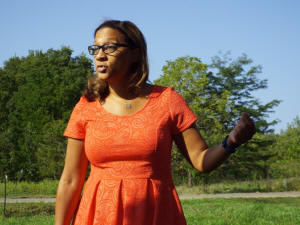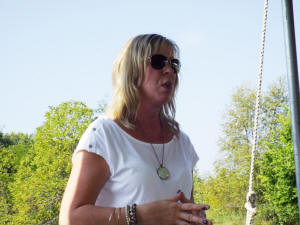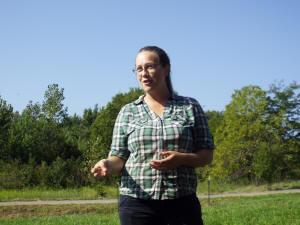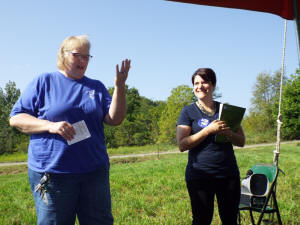|
 Bishop has been a proponent of organic farming for quite some
time and is involved with stewardship projects as well as hosting
University of Illinois research projects. The goal in sustainable
farming practices is to reduce or eliminate toxic chemical use found
in herbicides, pesticides and fertilizers. Organic and sustainable
agriculture are terms often not understood by the general public.
The field day is intended to educate as well as share resources and
knowledge among professionals who have the same goals as Bishop –
wise use of the land to grow premium crops and foods at a profit. Bishop has been a proponent of organic farming for quite some
time and is involved with stewardship projects as well as hosting
University of Illinois research projects. The goal in sustainable
farming practices is to reduce or eliminate toxic chemical use found
in herbicides, pesticides and fertilizers. Organic and sustainable
agriculture are terms often not understood by the general public.
The field day is intended to educate as well as share resources and
knowledge among professionals who have the same goals as Bishop –
wise use of the land to grow premium crops and foods at a profit.
On Tuesday a diverse line-up of speakers would address a full-range
of topics from field to table on agriculture, finances, marketing
and health. Researchers, experts and representatives of agencies
would address the various aspects of organic farming and sustainable
farming, profitability in organic farming, and the health benefits
to those who purchase fresh, whole, non-processed foods, or
organically grown products.
Bishop opened the day by introducing a variety of vendors who
supplied brochures and print information for guests. He then spoke
briefly about the two primary elements necessary for successful
sustainable farming programs.
Bishop said that first, the system used to establish sustainable
farming needs to be a plan that can be used not just for the
immediate season, but for the future. In other words, it needs to be
a long-term plan that requires little adaption to work
year-after-year.
 Secondly, Bishop said that to be successful, a program has to be
profitable. In contrast to conventional farming practices, Bishop
said one key is to control the output, to not over-produce, because
larger supplies will create lower prices. He said the goal is to
avoid what is going on today in conventional farming where supplies
are larger than the demand. Prices fall to make the abundant supply
more marketable.
Dr. Nicole Florence, Memorial Health Systems, Abraham Lincoln
Memorial Hospital

Bishop moved on quickly to the first guest speaker, Dr. Nicole
Florence. Dr. Florence works with the weight loss programs at
both Memorial Hospital in Springfield and Abraham Lincoln
Memorial Hospital in Lincoln. She spoke about the obesity
statistics that say one in three American’s is overweight. She
then went on to talk about how the hospital programs are
attempting to teach clients about making healthy choices, buying
fresh fruits and vegetables, and how to cook in the home.
Florence said it is disturbing to realize how many people today
do not know how to cook a real meal from scratch. They are
eating fast foods, either at restaurants, or products that can
be purchased at the grocery or convenience store, and placed in
the microwave for a quick and easy meal. These are the same
products that are loaded with additives, high in fats, and
overall, not healthy.
Florence said that obesity leads to diabetes, and that is a $150
billion cost in the healthcare industry. She said that the goal
of her programs is to break the chain through education. She
said the motto of the program is “Eat like you matter.” The
program includes teaching about shopping for food, using the
practice of buying items that are cost effective over cheap,
educating youth on the benefits of healthy eating, teaching
families to cook, and helping to eliminate the barriers that
prevent them from making healthy choices.
 Florence said if obesity could be eliminated, diabetes would no
longer exist. Doing away with this one disease would have an
enormous impact on medical costs, insurance costs and more for
all Americans.
When Florence finished, Bishop summed it up with a few words,
“Food is medicine.”
Rebecca Huston, Illinois State Treasurer’s Office

It takes money to farm, whether it be an organic farm or
conventional, operating cash is difficult to come by some years.
Huston was there to address a loan guarantee program offered by
the Illinois State Treasurer’s Office.
She explained the AgInvest program. The program works through
local banks to help secure loans and operating cash for area
farmers. She said that there had been improvements made to the
program that allows farmers to secure larger loans for longer
periods of time and now offers fixed interest rates.
Huston noted that the program is not a state loan of cash, but
it is a subsidy program for interest rates, to make the
borrowing more affordable for the producer. She said there is
also a long list of items that the state will permit in this
program, such as money for crops, but also money for livestock,
for buildings or infrastructure, and for the refinancing of
debt. She also noted that right now, many people don't know
about this program, including the bankers.

[to top of second column] |

Rebecca Osland, Illinois Stewardship Alliance

The next speaker was Rebecca Osland of the Illinois Stewardship
Alliance.
From the Alliance website: “We envision a system where soils are
treated as a precious resource, local food producers earn a fair,
living wage, local food education is integrated into all levels of
education, infrastructure is rebuilt to accommodate local food
systems, and good food is available for all.”
Osland is just completing her first year with the Alliance. She is
an attorney, working on State as well as Federal legislation that
will help the Alliance achieve its vision. Osland noted to the group
that she also has first-hand knowledge of the work at PrairiErth
Farms because she worked on the farm for a time, learning about
organic and sustainable farming along the way.
Osland offered an update on the four bills presented, all of which
have gone through the state legislature; three have been signed by
Governor Bruce Rauner, and the fourth was vetoed under an amendatory
veto by the governor. While he rejected the bill, he suggested
changes to it that he would support and it will be presented again.
Osland also talked about a new “trendy” program that is being
promoted by the Alliance; seed libraries. She explained these are
locations, often hosted in public libraries where that gardeners can
get seeds that have been donated by other gardeners, and raise them
in their gardens. They also have the option to save seeds from the
produce they grow and donate it back to the seed library.

She said the program was voluntary, and the initial seeds were
donated by growers, not necessarily seed companies. However, the
Alliance had faced challenges with the program because the
Departments of Agriculture wanted to place the same restrictions and
controls on these seed libraries as they have over the seed
companies. She said she had taken this matter up before the state
legislature, attempting to relieve the program from these
restrictions and had done so with some success.
Janet Beach-Davis and Lauren Denofrio-Corrales, Heartland
Community College, Normal

According to Janet Beach-Davis many people do not realize that
Heartland Community College offers an Agricultural Education program
in its curriculum, but it does and it is a program that is growing.
She and Denofrio-Corrales were happy to share what the college is
doing in the line of agriculture education.
HCC recently purchased a farm next to its Normal campus. Davis said
the farm is the prime location to develop small plot farming where
students can work with food farming projects such as food forests
and more. The college is also hopeful that portions of the farm can
be divided out for livestock production as well.
Davis also noted that there is no longer a Farmer’s Market in
Normal. With the purchase of the farm property and the development
of food plots, it appears to be a natural fit that the college will
develop a Farmer’s Market program. It would be held at the farm,
which is conveniently located at the edge of town where there is
plenty of space for vendors and shoppers.
Because HCC is a junior college, Davis said the programs are for
those who are looking to learn the “how to’s” of food production,
and not necessarily earn a degree in agriculture.
At the same time, Denofrio-Corrales said the college is working
toward developing a two-year degree in agriculture. The two HCC
representatives said that as they grow their program, there are
needs. There is a need for instructors first of all. To teach at HCC,
an instructor will have to have a master’s degree in agriculture.
The college also needs sponsorships for the farm program, plus it is
always looking for speakers who can add to the educational
experience for the students.

Another thing the agriculture program needs in input from producers.
The question is what do producers want from a young person
completing the HCC Ag program, what skills and knowledge are going
to make that graduate employable?
When the representatives from HCC finished speaking, Bishop said
that the next portion of the day would include a tour of the
University of Illinois Test Plot located just a few feet away from
the site of the presentations.
Dr. Tony Yannarell, and graduate students Elizabeth Miernicki and
Cassandra Wilcoxen each gave brief talks on the work that is being
done at the test plot. Lincoln Daily News coverage of the September
6th field day will resume with the U of I presentation as well as
other speakers.
[Nila Smith] |